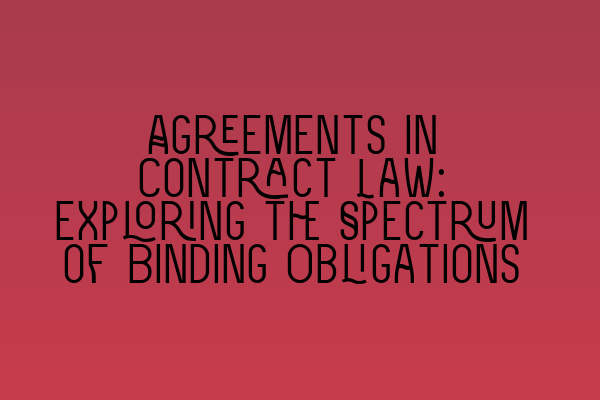Agreements in Contract Law: Exploring the Spectrum of Binding Obligations
In the vast world of contract law, agreements serve as the cornerstone of legal relationships. Whether you’re a solicitor, law student, or simply interested in understanding the intricacies of contract law, this comprehensive guide will take you on a journey through the spectrum of binding obligations.
Before we dive into the complexities, let’s establish a common understanding of what an agreement entails. In its simplest form, an agreement is a meeting of minds between two or more parties, where they mutually express their intention to create legal relations. This expression of mutual consent forms the foundation of a legally binding obligation.
To illustrate this, let’s consider a hypothetical scenario. John and Mary, two individuals with a shared passion for vintage cars, agree to enter into a contract for the sale of John’s classic muscle car. They negotiate the price, delivery date, and any additional terms they deem necessary to govern their transaction. By doing so, they create an agreement that, when accepted by both parties, becomes a binding contract.
Now that we’ve established the essence of an agreement, it’s time to explore the spectrum of binding obligations. Contracts can vary in their level of formality and enforceability, and understanding these distinctions is essential to navigate the legal landscape adeptly.
1. Express Contracts:
Express contracts leave no room for ambiguity as they are explicitly stated by the parties involved, either orally or in writing. These contracts often include formal contractual documents such as leases, employment contracts, or loan agreements. Legal professionals often advise clients to have express contracts in writing to mitigate the risk of disputes and ensure enforceability. If you want to test your knowledge on SQE 1 Practice Exam Questions, check out this article.
2. Implied Contracts:
Unlike express contracts, implied contracts are not explicitly laid out by the parties involved. Instead, they are inferred from their conduct or the circumstances surrounding their actions. For example, when you enter a restaurant and order a meal, an implied contract is formed, where you agree to pay for the food in return for the services rendered. Understanding the nuances of implied contracts is crucial to avoid unintended legal obligations.
3. Void Contracts:
A void contract lacks legal enforceability from its inception. It is deemed invalid and holds no legal effect. This occurs when a contract violates a fundamental principle of law, is contrary to public policy, or involves illegal activities. For SQE 1 candidates seeking further preparation, SQE 1 Practice Mocks FLK1 FLK2 can be a useful resource.
4. Voidable Contracts:
Voidable contracts, on the other hand, are initially valid but can be annulled by one or more parties involved due to certain circumstances. These circumstances can include undue influence, misrepresentation, or the incapacity of one of the parties. An example of a voidable contract is when a minor enters into an agreement that can be voided by their legal guardian.
5. Unenforceable Contracts:
Unenforceable contracts are valid agreements, but due to technicalities, they cannot be enforced by a court of law. This often occurs when a contract fails to meet certain formal requirements, such as not being in writing when required by law. It’s important to note that unenforceable contracts can become enforceable if those technicalities are rectified.
As you navigate the terrain of contract law, it’s crucial to stay updated on the latest developments and regulations. Comprehensive SQE 2 Preparation Courses can provide you with the necessary knowledge and skills to succeed in the world of contract law. Additionally, understanding the intricacies of SQE 1 Preparation Courses is essential for aspiring solicitors looking to excel in their profession.
Before we conclude, let’s touch upon the importance of being aware of SRA SQE Exam Dates. Staying informed about upcoming exams allows you to plan your preparation effectively and ensure you’re fully prepared when the time comes to put your hard-earned knowledge to the test.
In conclusion, agreements in contract law span a spectrum of binding obligations. Express contracts leave no room for ambiguity, while implied contracts are inferred from conduct or circumstances. Void contracts lack legal enforceability, while voidable contracts can be annulled under specific circumstances. Unenforceable contracts are valid but suffer from technicalities. By understanding the intricacies within this spectrum, you’ll be better equipped to navigate the complex world of contract law.
Remember, knowledge and preparation are key. Whether you’re a solicitor navigating complex contractual negotiations or a law student preparing for the SQE exams, continuous learning and staying informed of the latest developments will pave the way for success.
Disclaimer: This article is for informational purposes only and does not constitute legal advice. Always consult with a qualified solicitor for any specific legal concerns.
